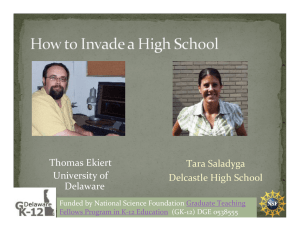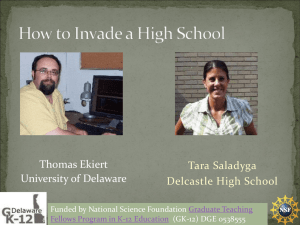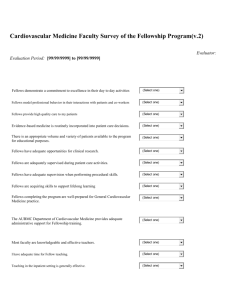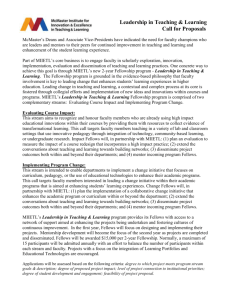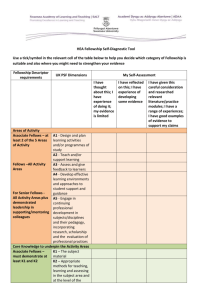Center for Educational Transformation Request for Applications for
advertisement
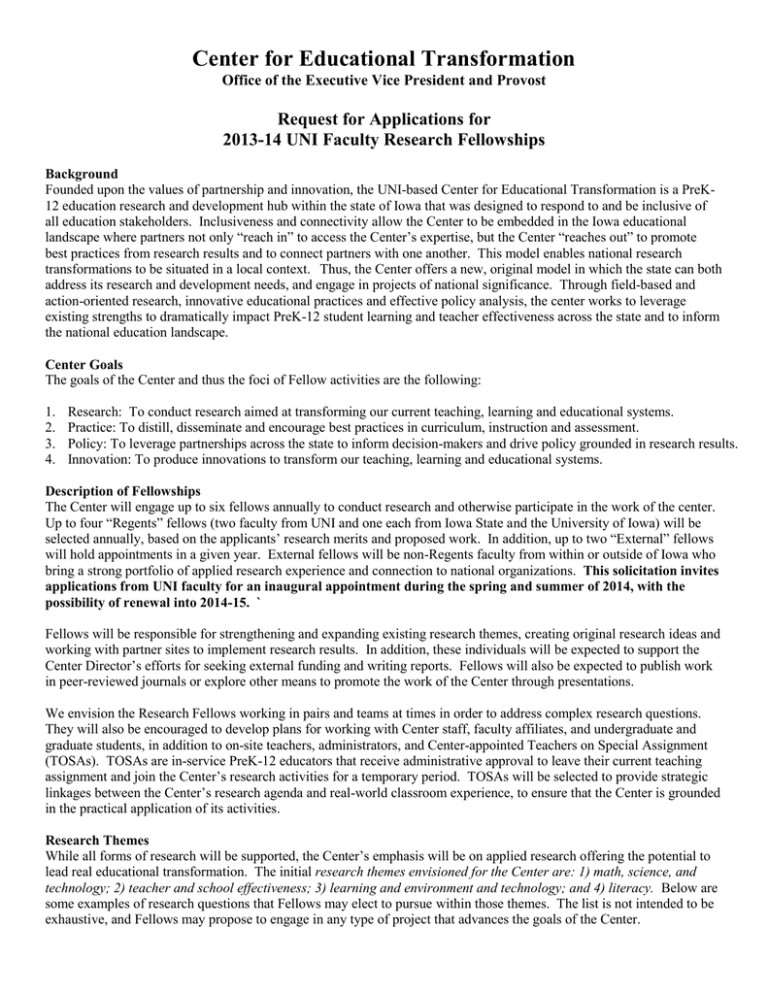
Center for Educational Transformation Office of the Executive Vice President and Provost Request for Applications for 2013-14 UNI Faculty Research Fellowships Background Founded upon the values of partnership and innovation, the UNI-based Center for Educational Transformation is a PreK12 education research and development hub within the state of Iowa that was designed to respond to and be inclusive of all education stakeholders. Inclusiveness and connectivity allow the Center to be embedded in the Iowa educational landscape where partners not only “reach in” to access the Center’s expertise, but the Center “reaches out” to promote best practices from research results and to connect partners with one another. This model enables national research transformations to be situated in a local context. Thus, the Center offers a new, original model in which the state can both address its research and development needs, and engage in projects of national significance. Through field-based and action-oriented research, innovative educational practices and effective policy analysis, the center works to leverage existing strengths to dramatically impact PreK-12 student learning and teacher effectiveness across the state and to inform the national education landscape. Center Goals The goals of the Center and thus the foci of Fellow activities are the following: 1. 2. 3. 4. Research: To conduct research aimed at transforming our current teaching, learning and educational systems. Practice: To distill, disseminate and encourage best practices in curriculum, instruction and assessment. Policy: To leverage partnerships across the state to inform decision-makers and drive policy grounded in research results. Innovation: To produce innovations to transform our teaching, learning and educational systems. Description of Fellowships The Center will engage up to six fellows annually to conduct research and otherwise participate in the work of the center. Up to four “Regents” fellows (two faculty from UNI and one each from Iowa State and the University of Iowa) will be selected annually, based on the applicants’ research merits and proposed work. In addition, up to two “External” fellows will hold appointments in a given year. External fellows will be non-Regents faculty from within or outside of Iowa who bring a strong portfolio of applied research experience and connection to national organizations. This solicitation invites applications from UNI faculty for an inaugural appointment during the spring and summer of 2014, with the possibility of renewal into 2014-15. ` Fellows will be responsible for strengthening and expanding existing research themes, creating original research ideas and working with partner sites to implement research results. In addition, these individuals will be expected to support the Center Director’s efforts for seeking external funding and writing reports. Fellows will also be expected to publish work in peer-reviewed journals or explore other means to promote the work of the Center through presentations. We envision the Research Fellows working in pairs and teams at times in order to address complex research questions. They will also be encouraged to develop plans for working with Center staff, faculty affiliates, and undergraduate and graduate students, in addition to on-site teachers, administrators, and Center-appointed Teachers on Special Assignment (TOSAs). TOSAs are in-service PreK-12 educators that receive administrative approval to leave their current teaching assignment and join the Center’s research activities for a temporary period. TOSAs will be selected to provide strategic linkages between the Center’s research agenda and real-world classroom experience, to ensure that the Center is grounded in the practical application of its activities. Research Themes While all forms of research will be supported, the Center’s emphasis will be on applied research offering the potential to lead real educational transformation. The initial research themes envisioned for the Center are: 1) math, science, and technology; 2) teacher and school effectiveness; 3) learning and environment and technology; and 4) literacy. Below are some examples of research questions that Fellows may elect to pursue within those themes. The list is not intended to be exhaustive, and Fellows may propose to engage in any type of project that advances the goals of the Center. How can diversity in the teacher workforce be increased? One example of a proposed project would be to explore pipeline programs, cluster hiring, and salary incentives, and pilot other methods to recruit educators from diverse backgrounds. The objective would be to determine the best possible strategies for districts to attract and retain teachers from diverse backgrounds. Both the Cedar Falls, Iowa Community Schools and the Linn-Mar Community School District in Marion, Iowa have expressed interest in participating in research around this issue. How can rigor in mathematics and science at the elementary and middle school levels be reinvented? Due to time constraints, elementary and middle school teachers have a tendency to teach textbook-based science as opposed to inquiry-based science. Fellows may propose to investigate models of integrative inquiry-based science and provide action research opportunities for elementary and middle level teachers who will innovate their instructional practices in the sciences in order to study the effects on student performance. Current work in the Council Bluffs, Iowa Community School District can be leveraged toward pursuing this research question. How can a district close the achievement gap? Many Iowa districts struggle with racial achievement gap concerns and several have approached UNI to assist in specific areas, such as literacy. A prospective Fellow might propose to assist these districts in reviewing their data and practices to identify innovative solutions, and then go into the schools to observe teaching practices, climate and culture dynamics, and leadership techniques. Fellows would then create a set of practices to address the concern. Practices are then implemented with fidelity and outcomes are assessed. Which curriculum design is most conducive to impact career readiness in junior and senior humanities courses? The humanities curriculum in the high schools is intended to provide learners with broad liberal arts knowledge that are to prepare them to be college, career, and citizenry ready. A Fellow could investigate current curriculum alignments with the Common Core Standards and determine whether learners can show competence as measured by Smarter Balanced assessments. Smarter Balanced assessments measure student progress toward meeting Common Core Standards at specific tested learning levels throughout the course of an entire school year. How can early interventions offset language acquisition gaps? The Hart and Risley 1995 study on language acquisition showed that learners arriving in kindergarten at age five have language gaps if they are from welfare or working class homes as opposed to those from professional class homes. This language acquisition gap follows the learners and is the basis for the third grade reading gap. A Fellow could conduct current research on language acquisition and vocabulary development in order to provide evidence for policy to support universal preschool programs and early childhood interventions. Can preservice teachers develop linguistic competencies to support the achievement of second language learners? Research could be conducted on practices that are necessary for preservice teachers to gain linguistic competencies. The ability of the preservice teachers to utilize these competences would be measured via teacher performance assessments. We would anticipate that the second language learners in classes with preservice teachers who possess these assessed competencies outpace second language learners in other classes who do not have preservice teachers with said competencies. Study results might lead, for example, to a Center presentation to the Board of Educational Examiners requesting a policy change requiring preservice teachers to take courses pertaining to English Language Learners (ELL). How can Technological, Pedagogical and Content Knowledge (TPACK) be applied and disseminated? The infiltration of technology into society has yet to meaningfully infiltrate education. A teacher who is TPACK-literate is one who is confident in all of these areas and can employ these skills to provide an effective learning experience for students. This project might explore TPACK in the context of rural versus urban and suburban schools. In addition, the socioeconomic impacts of 1:1 technology could be studied. Dissemination Each research project proposed by Center fellows must include consideration of the best possible methods of disseminating its results within Iowa and across the nation. In addition to peer-reviewed publication and local, state, and national presentations, Fellows will participate in periodic summits convened by the Center. These “innovation sessions” will convene statewide partners, providing a means by which the Center’s research activities can be synthesized and critical innovations shared. Time Commitments and Compensation This initial solicitation is inviting applications for the spring AND summer of 2014, whereby applicants must propose to undertake activities that can be accomplished within that time frame. However, a typical CET Regents fellowship will last for 1 year, with the opportunity for renewal. Therefore, applicants may share plans for longer term activities, with the caveat that real progress and results must be achieved during the initial fellowship term. Although the possibility of renewal exists, fellows desiring to continue beyond the summer of 2014 will be required to submit a competitive continuation application during the regular solicitation process for the 2014-2015 school year. All internal UNI Fellows will receive one course release during the spring of 2014. During the summer of 2014, fellows will be engaged for the equivalent of four weeks, full-time, and paid a $ 5,000 stipend for that period. Fellows may select which four-week summer period their fellowship activities will occur, but may not teach during the period selected. Fellows may also request support for a limited amount of project expenses if they are clearly necessary to accomplish the work, such as subject stipends, travel expenses, and supplies and materials. Management and Oversight All Fellows will report to the Center Director and be accountable to the Center leadership (e.g., Steering Committee) and Advisory Board. A national search for the Center Director is underway. The Steering Committee is currently comprised of UNI Provost Gibson, COE Dean Dwight Watson, CHAS Dean Joel Haack, and Anita Gordon, RSP Director of Research Services. The inter-institutional Advisory Board, which will hold its inaugural meeting this fall, will be consulted on appropriate measures of evaluating Fellow progress and outcomes, tailored to each individual’s proposal and negotiated Fellowship agreement. Fellowships may be suspended or terminated in the event a Fellow does not make satisfactory progress as outlined in the agreement. Fellows may expect to receive mentoring, guidance, and resources from the Center in order to accomplish their goals. Application and Review Process In order to be given full consideration for a Fellowship, applicants must submit a proposal by the deadline that addresses the areas noted below and follows all formatting and other requirements. Proposals will be reviewed and scored by a review panel comprised of Center Steering Committee and Advisory Board members, and other education researchers and experts, as appropriate. The Steering Committee will make the final selections, using the recommendations of the broader review panel for guidance, and will negotiate terms of the fellowships with the awardees. Submission Process Hard copy applications should be directed to: Anita Gordon, RSP, 213 East Bartlett Hall, mail code 0349 Alternatively, applications may be scanned into PDF and emailed to: anita.gordon@uni.edu. Questions may be directed to: Anita Gordon at 319-273-6148 or anita.gordon@uni.edu. Due Dates Emailed fellowship applications must be submitted no later than November 11, 2013. Hard copy applications must be received by that date. Selection and notifications are anticipated by December 4, 2013. Fellowships will begin on the first day of the spring semester, 2014. Center for Educational Transformation (CET) RESEARCH FELLOWSHIP - APPLICATION COVER SHEET Proposal Deadline: November 11, 2013 (for Spring & Summer, 2014) Proposal Title: _____________________________________________________________________________ Name: __________________________________________ Title: _________________________________ Department: _______________________________________________________________________________ Organization: _______________________________________________________________________________ Address: ___________________________________________________________________________________ Email: ____________________________________ Telephone: ________________________________ ABSTRACT (250 WORDS) APPROVAL SIGNATURES (REQUIRED) The Fellow and his/her Dept. Head and Dean are required to sign below. PI/PD_________________________________________________________________ DATE_________________ DEPT__________________________________________________________________ DATE_________________ DEAN__________________________________________________________________ DATE_________________ Signed form may be scanned into PDF and submitted to anita.gordon@uni.edu Center for Educational Transformation (CET) Applications for Faculty Research Fellowships for Spring and Summer 2014 Application Deadline: November 11, 2013 A complete application will consist of: 1) Application Cover Sheet (Use attached form.) 2) Project Narrative Maximum length: 6 pages, single-spaced; 12 pt font; 1” margins Narrative content: A. Goals and Objectives/Specific Aims 1. Introduce your research agenda, project or topic; and specify what your research questions and what you hope to accomplish through the fellowship. 2. Note which courses you are assigned to teach, and which course release(s) you are requesting. (Be sure to confer with your department head prior to the application due date to ensure your proposed course release(s) will be feasible.) B. Need and Significance 1. Explain why this is an important activity or topic, grounding it in what you and others in the field have already established and what still remains to be done. How will this project contribute to your field and/or to the community, state, or nation? 2. How does your proposed work address the Center’s goals and research themes? C. Design and Methods 1. Be specific about your project or research design and/or exactly who will do what and when. Make certain your design aligns with your stated goals and objectives. 2. Include a project timeline. Make it clear which outcomes will be accomplished by the end of this fellowship period. D. Qualifications and Resources 1. Briefly note any particular components of your CV which support your capacity to carry out the proposed activities. 2. Outline any plans you have at this point for how to work with potential faculty affiliates, consultants, or colleagues, students, and/or TOSAs. Name any individuals that have already been identified as potential collaborators or personnel (attach a 2 page biosketch for each). If not yet identified, note how many and what qualifications for each type of collaborator you would ideally need to carry out the work proposed. 3. Explain how you will work with any external organizations, such as other institutions, schools or community organizations. E. Budget and Funding 1. Identify any critical resources that you are requesting from the Center and the amounts anticipated (e.g., funding for subject stipends, special software, project materials and supplies, travel costs, etc.) 2. Are there any other resources, cash or in-kind, being contributed to the project? If so, what are the sources of those? Describe any other funds you’ve already received to date or anticipate receiving in support of these particular project activities. 3. Most Center research and development activities should be able to garner external funding support at some point. Identify any funder(s) and grant program(s) that you have identified as a good match to support your proposed work, and explain how you know they are a promising avenue for external support. 3) References 4) CVs/Resumes – Attach your own CV, and a 2 page biosketch for any other Key Personnel to be involved (as discussed in D2 above).
